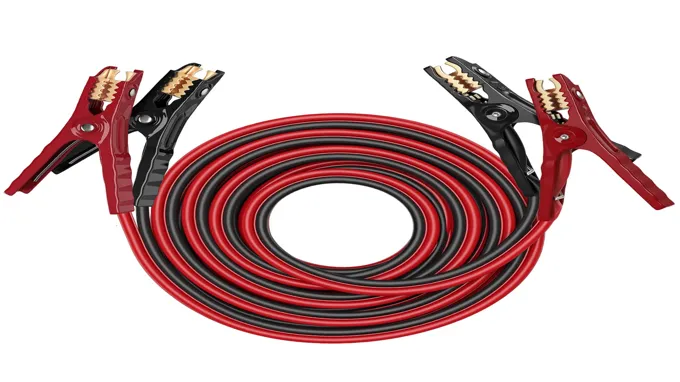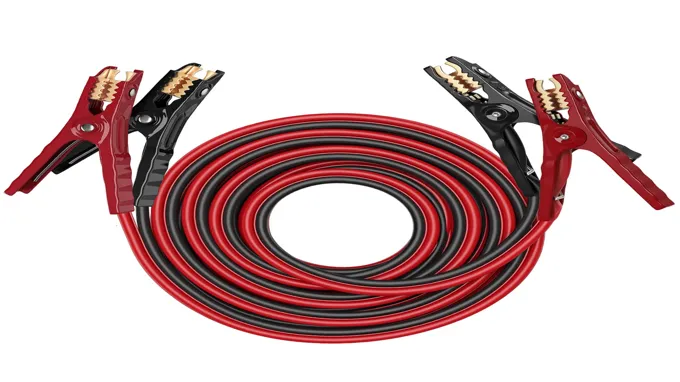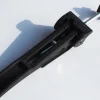It’s a situation we’ve all experienced before – a dead car battery. And the solution is simple: just connect jumper cables to another car and get a quick boost. But have you ever considered the gauge of your jumper cables? Surprisingly, it plays a crucial role in the effectiveness of jump-starting your car.
The gauge of a jumper cable is the thickness of the cable wire – the lower the gauge number, the thicker the wire. It determines the amount of current that can flow through the cable, which directly correlates to the quickness and effectiveness of jump-starting your car. Choosing the right gauge is crucial to avoid any damage or safety risks to both vehicles.
With so many options available, it can be overwhelming deciding on what gauge to choose. Factors such as the size of your vehicle and the length of the cable come into play, making it essential to know the basics of jumper cable gauges. In this blog post, we’ll walk you through everything you need to know about choosing the right gauge of jumper cables for your car.
So next time you find yourself with a dead battery, you can jump-start with confidence.
Table of Contents
Understanding gauge measurement
Jumper cables are an essential item to keep in your car in case of emergencies. However, not all jumper cables are created equal, and understanding the gauge measurement is critical to ensuring your jumper cables are suitable for your needs. The gauge measurement refers to the thickness of the copper wire inside the cable.
The lower the gauge number, the thicker the wire is, which means it can carry more current and is more durable. Typically, jumper cables come in 4, 6, or 8-gauge thicknesses, with 4-gauge being the thickest. It’s crucial to choose the appropriate gauge for your vehicle because using an insufficient gauge can result in the cables melting or catching on fire.
So, when selecting jumper cables, ensure you consider the size of your car’s engine and what type of battery it has. Ultimately, the appropriate gauge of jumper cables can make the difference between quickly jumpstarting your vehicle or causing further problems.
Gauge measurement explained
Gauge measurement is an essential concept in many industries, including automotive, aerospace, and construction. Simply put, a gauge is a tool used to measure the size, thickness, or distance of an object. It usually consists of a scale and a pointer, allowing the user to read the measurement accurately.
In engineering, gauge measurement is often expressed in a unit of measurement such as inches, millimeters, or micrometers. The accuracy of gauge measurement is crucial in ensuring the reliability and safety of products. Therefore, engineers and inspectors use calibrated instruments and follow strict guidelines to ensure precise measurement.
Knowing how to interpret gauge readings is also important because the values can vary based on the type of gauge used and the specific application. By understanding gauge measurement, we can ensure that the products we create and use meet the necessary standards for quality and safety.

Wire thickness and resistance
Wire thickness, resistance, gauge measurement Have you ever wondered why electrical wires come in different thicknesses? The reason behind this is due to the amount of electrical resistance. The thicker the wire, the less electrical resistance it has. One way to measure the thickness of a wire is through gauge measurement.
The gauge measurement system is based on the number of wire draws needed to produce a particular thickness of wire. The smaller the gauge number, the thicker the wire. For instance, a 16 gauge wire is thicker than a 22 gauge wire.
The gauge measurement system is essential in determining the right wire thickness needed for a specific application. It is crucial to choose the right wire thickness to avoid issues such as heat buildup, voltage drop, and even electrical fires. So, the next time you are looking for electrical wires, make sure to understand the gauge measurement system to ensure you select the right wire thickness needed for your project.
Factors to consider when selecting jumper cable gauge
If you’re wondering what gauge for jumper cables is best suited for your car, several factors come into play. The most important ones are the length of the cables, the amperage rating of your car’s battery, and the power that needs to be transferred. Jumper cable gauges range from 8 to 2, with a higher gauge meaning a thinner cable.
A thicker cable can handle more current, which is essential for larger vehicles, like trucks or SUVs. However, thicker cables can be more challenging to maneuver and store. For smaller cars, 10-12 gauge cable should suffice, while heavier vehicles need 2-4 gauge cables.
You should also consider the insulation level of your cables. Cheap cables tend to have lower insulation, which can lead to electric shocks or sparks. Therefore, it’s crucial to invest in high-quality cables that are properly insulated to avoid any mishaps.
Length of cable
When it comes to selecting the appropriate gauge for your jumper cable, there are several factors to consider. One of the most critical factors is the length of the cable. The longer the cable, the thicker the gauge should be.
This is because the longer the cable, the more resistance it will have. A thicker gauge would help reduce this resistance, resulting in a better flow of electricity. Another factor to consider is the type of vehicle you’ll be using the jumper cable on.
If you’re using it on a small car, a thinner gauge may work just fine. However, if it’s a larger vehicle like an SUV or truck, you may need a thicker gauge to handle the higher electrical load. In conclusion, understanding the length of the cable and the type of vehicle you’re working on will help you pick the right gauge for your jumper cable, ensuring that it works correctly when you need it most.
Amperage of vehicle’s battery
When it comes to jump-starting your vehicle, jumper cables are a must-have tool in your car’s emergency kit. However, selecting the right jumper cable gauge to use can be a bit confusing. The amperage of your vehicle’s battery is an essential factor to consider when choosing the right size cable.
The higher the amperage of your vehicle’s battery, the thicker the gauge of cable you should use. Larger gauge cables can handle more amperage and are best suited for vehicles with larger batteries or higher amperage usage. Choosing the right gauge of jumper cables is crucial in providing the necessary power to jump-start your vehicle.
Whether it’s a road trip or an emergency situation, having the right size cables can make a huge difference. So, make sure to equip yourself with the proper gauge jumper cables to ensure you’re prepared for any situation on the road.
Temperature and climate
When selecting jumper cable gauge, it’s important to consider the temperature and climate in which you’ll be using them. The thicker the cable, the less resistance it will have to the flow of electricity, which can be helpful in colder temperatures where the flow of electricity may already be reduced. However, in hotter temperatures, thicker cables can actually increase resistance and make the flow of electricity slower.
It’s also important to consider burstiness – the maximum amount of energy the cable can handle at once. Choosing a gauge that’s too small can cause the cable to overheat and potentially start a fire, while choosing a gauge that’s too large can be unnecessarily bulky and difficult to handle. It’s important to find a balance between temperature considerations and burstiness when selecting the right gauge for your jumper cables.
Recommended gauge for common vehicle types
If you’re ever in a situation where you need to jump-start your vehicle, having the right gauge jumper cables can make a big difference. The gauge refers to the thickness of the cable, with a lower gauge number indicating a thicker cable. For most passenger cars and light trucks, a 10-gauge cable is sufficient, although a 12-gauge cable can work in a pinch.
If you have a larger vehicle such as an SUV or pickup truck, a 4 or 6-gauge cable is recommended to provide enough power to start the engine. It’s important to note that using a gauge that’s too small can result in the cables overheating and even melting, so it’s always better to err on the side of caution and go with a thicker cable. So, to answer the question, what gauge for jumper cables? It ultimately depends on the type of vehicle you have, but generally speaking, a 10-gauge cable is a good option for most drivers.
Compact cars and sedans
For compact cars and sedans, the recommended tire pressure gauge is typically between 30-35 PSI. However, it’s important to note that the exact recommended tire pressure can vary for each specific make and model. It’s always best to check your owner’s manual or consult with a professional if you’re unsure.
Maintaining proper tire pressure not only ensures optimal performance and handling of your vehicle, but it also improves fuel efficiency and increases the life of your tires. It’s recommended to check your tire pressure at least once a month and before any long road trips. By keeping your tires properly inflated, you can have a safer and more comfortable driving experience on the road.
Mid-size cars and SUVs
If you own a mid-size car or SUV, it’s important to choose the appropriate tire gauge to ensure your vehicle performs at its best. The recommended gauge for most mid-size cars is a tire pressure of between 30 and 32 PSI for both front and rear tires. SUVs, on the other hand, tend to handle better with a slightly higher tire pressure of between 32 and 34 PSI.
Keep in mind that tire pressure can fluctuate with changes in temperature or driving conditions, so it’s important to regularly check your tires with a reliable gauge. By maintaining proper tire pressure, you can improve fuel efficiency, extend the life of your tires, and ensure better handling and safety while driving. Don’t compromise the performance of your vehicle – make sure you’re using the right tire gauge for your mid-size car or SUV.
Large trucks and SUVs
Large trucks and SUVs require a heavier gauge wire due to their high electrical load demands. A recommended gauge size for these types of vehicles is 4 or 2 gauge wire. The larger diameter of the wire ensures that there is less voltage drop, which means that all the electrical components in the vehicle will work more efficiently.
This larger gauge wire is also capable of handling higher currents, which is essential for large vehicles. It’s important to note that the gauge size needed also depends on the length of the wire, so it’s essential to consider the distance between the battery and the electrical components. Investing in the appropriate gauge wire for your vehicle is crucial in ensuring optimal performance and longevity of both your electrical system and the vehicle itself.
So why not ensure your truck or SUV is running at peak efficiency by considering investing in the recommended 4 or 2 gauge wire?
Conclusion: Importance of choosing the right gauge
In the end, the gauge for jumper cables is like the Goldilocks principle – not too big, not too small, but just right. You want to make sure you have a gauge that is thick enough to handle the current needs of your car, but not so thick that it becomes cumbersome to use. So, whether you’re a professional mechanic or just someone looking to jump-start your car, remember to always choose a gauge that is just right for your needs.
“
FAQs
1. What is the standard length for jumper cables? A: The standard length for jumper cables is 12 feet. 2. Can I jump start my car with a lower gauge jumper cable? A: Yes, a lower gauge jumper cable can handle more current flow and will provide a better jump start solution than a higher gauge cable. 3. What is a recommended gauge for jumper cables for a standard passenger car? A: A 10-gauge or 8-gauge jumper cable is recommended for a standard passenger car. 4. Can I use a jumper cable with a higher gauge number than recommended for my car? A: Yes, you can use a higher gauge jumper cable, but it may take longer to charge the dead battery and may not be as efficient as using a lower gauge cable. 5. Are there different types of jumper cables for different types of vehicles? A: Yes, heavy-duty and commercial-grade jumper cables are recommended for larger vehicles such as trucks and buses. 6. What is the maximum recommended length for jumper cables? A: The maximum recommended length for jumper cables is 20 feet. 7. Can I use a damaged or frayed jumper cable to jumpstart my car? A: No, using a damaged or frayed jumper cable can be dangerous and increase the risk of electrical shock or fire. Always inspect your jumper cables before use. 8. How long should I let the dead battery charge before trying to start the car? A: Allow the dead battery to charge for at least 10-15 minutes before attempting to start the car. 9. Can I use a portable jumpstarter instead of jumper cables? A: Yes, a portable jumpstarter is a viable alternative to jumper cables and allows for ease of use without requiring another vehicle. 10. How often should I replace my jumper cables? A: Jumper cables should be replaced every 2-3 years or when signs of wear and tear occur.



